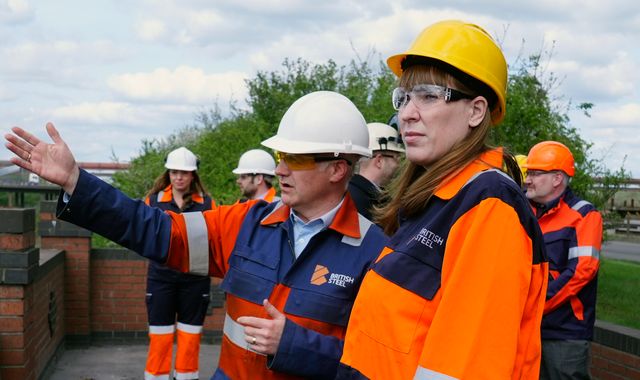British Steel: Raw materials needed for Scunthorpe plant 'paid for' amid race against time to avert shutdown
13 April 2025, 19:15 | Updated: 14 April 2025, 21:28

The raw materials needed to keep British Steel's Scunthorpe plant operating have been paid for, Deputy Prime Minister Angela Rayner has said - but she would not be drawn on when they would arrive.
Officials have been racing to obtain enough iron and coal to keep the furnaces at the UK's last virgin steel-producing plant going - because if they cool down too much, the molten iron solidifies and blocks the furnaces.
It comes after ministers rushed through an emergency bill on Saturday to take over the facility after talks with Chinese owners Jingye broke down.
Politics latest: Chinese embassy urges UK to act with 'fairness' on British Steel
Business Secretary Jonathan Reynolds said the government had been prompted into action after learning that the firm had stopped ordering new raw materials to keep the plant running and planned on selling off supplies it already had.
Speaking to reporters from the site in Scunthorpe on Monday afternoon, Ms Rayner said: "We've got the raw materials, they've been paid for, and we're confident that the furnaces will continue to fire."
Asked whether the materials would be arriving on Monday, the deputy PM only said: "As I say, we've got the raw materials, and everything's in place, and we're confident that the furnaces will continue."
Earlier, Exchequer Secretary to the Treasury James Murray told Sky News the raw materials were "in the UK" and "nearby" the Lincolnshire site.
He said there were "limits to what I can say" because there were "commercial operations going on here".
The prime minister's official spokesman said there were two ships carrying materials docked at Immingham port in North Lincolnshire, with "a third ship which is currently en route off the coast of Africa, which will be making its way to the UK".
Ministers have faced questions over why they are only just acting now, given unions warned earlier this month that Jingye decided to cancel future orders for the iron ore, coal and other raw materials needed to keep the furnaces running.
Parliament was recalled on Saturday so that emergency legislation could be passed bringing the steelworks into effective government control and officials were on site as soon as the new legislation came into force.
Read more:
What next for British Steel?
How Trump, China and Reform played their part as government steps in
Ms Rayner would not be drawn on the long-term plan, nor whether other buyers were interested or whether it would come down to nationalisation.
She said: "We've taken nothing off the table. We'd like to see private investment going forward... we’re confident of the future of British Steel."
'No evidence of sabotage'
Ms Rayner said the government "hasn't seen any evidence" of sabotage, when asked about suggestions that Jingye might have purposefully attempted to shut the blast furnaces down.
The Chinese company stepped in with a deal to buy British Steel's Scunthorpe plant out of insolvency five years ago.
Mr Reynolds told MPs on Saturday that the intention of Jingye... "was to cancel and refuse to pay for existing orders" which would have "irrevocably and unilaterally closed down primary steelmaking at British Steel".
Appearing on Sky News' Sunday Morning With Trevor Phillips, the business secretary said he would not bring a Chinese company into the "sensitive" steel sector again.
Commenting on the situation for the first time on Monday, a Chinese embassy spokesperson urged the British government to act with "fairness, impartiality and non-discrimination... to make sure the legitimate rights and interests of the Chinese company be protected".
"It is an objective fact that British steel companies have generally encountered difficulties in recent years," it added.
Companies including Tata - which ran the now-closed Port Talbot steelworks - and Rainham Steel have offered managerial support and materials to keep the Lincolnshire site running.
Union officials have said they are "hopeful" that the materials required at the North Lincolnshire works will arrive within the next 48 hours.
However Andy Prendergast, national secretary at the GMB, said there still needs to be "a deal to be done for the future" and their preference is "nationalisation of what is a key national asset".
The Conservatives accused the government of acting "too late" and implementing a "botched nationalisation" after ignoring warnings about the risk to the steelworks.
Shadow business secretary Andrew Griffith said: "The Labour government have landed themselves in a steel crisis entirely of their own making.
"They've made poor decisions and let the unions dictate their actions."
(c) Sky News 2025: British Steel: Raw materials needed for Scunthorpe plant 'paid for' amid race against time to avert shutdown












